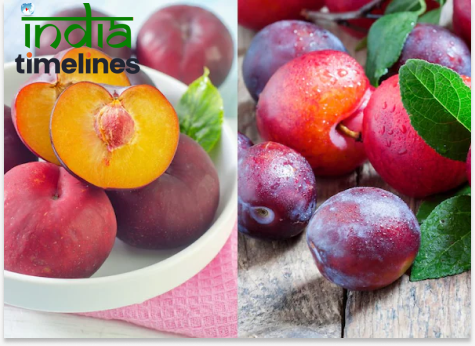
Plums might just be the underrated superfood you need to add to your daily diet. These small, juicy fruits are packed with nutrients that offer a range of health benefits, from improving heart health to enhancing skin appearance. If you’re looking for a delicious and nutritious way to boost your well-being, plums could be the answer.
Nutritional Profile of Plums
Vitamins and Minerals in Plums
Plums are a powerhouse of essential vitamins and minerals. They are rich in vitamin C, vitamin K, and vitamin A, all of which play crucial roles in maintaining overall health. Additionally, plums provide important minerals like potassium, which helps regulate blood pressure, and magnesium, essential for bone health.
Antioxidants and Phytochemicals
Beyond vitamins and minerals, plums are loaded with antioxidants and phytochemicals. These compounds help protect your cells from oxidative stress, reducing the risk of chronic diseases such as heart disease and cancer. The deep color of plums is a sign of their high anthocyanin content, a potent antioxidant.
Health Benefits of Plums
Heart Health
Plums are great for your heart. They contain fiber, which helps lower cholesterol levels by binding to it in the digestive system and preventing its absorption into the bloodstream. Additionally, the potassium in plums helps manage blood pressure by counteracting the effects of sodium. Regular consumption of plums can contribute to a healthier cardiovascular system.
Blood Sugar Control
For those concerned about blood sugar levels, plums are a smart choice. They have a low glycemic index, meaning they cause a slower, more gradual rise in blood sugar levels compared to other fruits. This makes plums a suitable snack for people with diabetes or anyone looking to maintain stable energy levels throughout the day.
Bone Health
Plums are also beneficial for your bones. They contain vitamin K, which is essential for bone metabolism and helps improve bone density. Studies have shown that regular consumption of plums or prunes (dried plums) can help prevent osteoporosis, a condition characterized by weak and brittle bones.
Digestive Health
If you’re looking to improve your digestive health, plums can be your ally. They act as a natural laxative due to their high fiber content, particularly soluble fiber, which adds bulk to the stool and promotes regular bowel movements. Additionally, plums support gut health by feeding beneficial bacteria in the digestive tract.
Skin Health
Your skin can benefit greatly from adding plums to your diet. The antioxidants in plums, such as vitamin C and beta-carotene, help protect your skin from damage caused by free radicals, which can lead to premature aging. Moreover, the high water content in plums aids in keeping your skin hydrated and glowing.
Immune System Support
Plums can give your immune system a significant boost. The vitamin C in plums is known for its immune-boosting properties, helping the body fight off infections. Additionally, the anti-inflammatory properties of plums can help reduce the risk of chronic inflammation, which is linked to various diseases.
Weight Management
If you’re trying to manage your weight, plums are a great fruit to include in your diet. They are low in calories yet high in fiber, which helps you feel full longer. This can prevent overeating and help you stick to a balanced diet. Plums make for a satisfying snack that can help curb your appetite.
Cognitive Health
Plums can also benefit your brain. The antioxidants in plums, particularly anthocyanins, are known to support cognitive function and protect against age-related neurodegenerative diseases such as Alzheimer’s. Including plums in your diet can help maintain mental sharpness as you age.
How to Incorporate Plums into Your Diet
Fresh Plums as a Snack
One of the easiest ways to enjoy plums is to eat them fresh as a snack. They are sweet, juicy, and can be enjoyed on their own or paired with a handful of nuts for a balanced snack.
Adding Plums to Salads and Smoothies
Plums add a delightful sweetness and texture to salads and smoothies. You can slice them and toss them into a green salad, or blend them with your favorite fruits and vegetables for a refreshing smoothie.
Cooking and Baking with Plums
Plums can be used in various recipes, from savory dishes to desserts. Try roasting plums with a sprinkle of cinnamon for a warm, comforting treat, or use them in pies, tarts, and crumbles for a naturally sweet dessert.
Dried Plums (Prunes) and Their Uses
Don’t forget about prunes, the dried version of plums. Prunes are equally nutritious and can be added to oatmeal, yogurt, or baked goods. They are also a popular ingredient in stews and sauces, adding a rich, sweet flavor.
Conclusion
Incorporating plums into your daily diet can provide a multitude of health benefits. From improving heart health and managing blood sugar levels to supporting bone health and enhancing skin appearance, plums are a versatile and nutritious addition to your meals. Whether you enjoy them fresh, dried, or cooked, plums are a delicious way to boost your overall health.
FAQs
- What are the key nutrients in plums?
Plums are rich in vitamins C, K, and A, as well as potassium, fiber, and antioxidants like anthocyanins. - How do plums help in managing blood sugar levels?
Plums have a low glycemic index, which means they cause a slower rise in blood sugar levels, making them suitable for people with diabetes. - Can plums improve skin health?
Yes, the antioxidants in plums, such as vitamin C and beta-carotene, help protect the skin from damage and keep it hydrated. - Are dried plums (prunes) as beneficial as fresh plums?
Yes, prunes are equally nutritious and offer similar health benefits, including supporting digestive health and bone density. - How many plums should I eat daily for health benefits?
Eating 2-3 plums a day can provide significant health benefits, but it’s always best to enjoy them as part of a balanced diet.






























